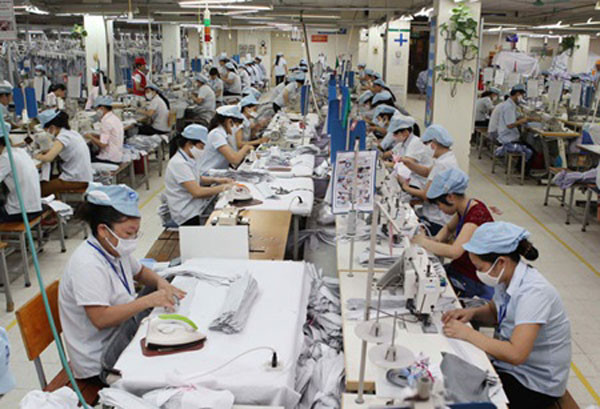Vietnamese textile and garment stocks may receive a boost after Vietnam completes free trade agreements with other countries and organisations, experts said at a recent meeting.
Dang Tran Hai Dang, deputy head of Vietinbank Securities Corporation's Market Analysis, said that textile-garment stocks were among the strongest gainers in the last 12 months with an increase of 27 percent in value, behind only construction material producers.
He said that most local producers have fulfilled their production capacity until the end of this year and lower input costs had helped them increase profit margins.
He said that the growth potential for textile-garment stocks is due to many positive factors that can boost the local market such as the price-to-earning (P/E) ratio now is 12, proving that the country has a lot of investment opportunities compared to other markets such as Malaysia with P/E of 17.31 and Thailand with P/E of 16.53.
Vu Duc Giang, president of the Vietnam Textile and Apparel Association (VITAS) said that the textile and garment industry will be among three industries receiving the most benefits from the free trade agreements (FTAs) that the country has or is now finalising, including the Trans-Pacific Partnership.
He said that Vietnamese textile-garment producers are now expanding production all around country and some of them, such as Viet Tien Garment JSC and Garment 10 Corporation are completing procedures to be listed on the stock market in the near future.
At the moment, some of textile-garment producers are already listed on the stock market, such as Binh Thanh Import-Export Production & Trade JSC (GIL), Everpia JSC (EVE) and Thanh Cong Textile Garment Investment Trading JSC (TCM).
The industry has recorded a good annual growth rate of 17-18 percent since Vietnam joined the World Trade Organisation (WTO) in late 2006.
Last year, the textile-garment industry exported 24.7 billion USD, equal to 16 percent of the country's total export value, and Vietnam was among the top six textile-garment exporters in the world with China, EU, Turkey, Bangladesh and India.
This year, VITAS targets a maximum export value of 28 billion USD.
Since the TPP talks reached final agreement in early October, Giang said that the TPP and other FTAs are expected to help boost the foreign direct investment (FDI) in the industry when they take effect.
FDI will provide huge additional capital for local companies, especially material producers as VITAS is trying to raise the percentage of local-made materials in textile-garment industry from the current 50 percent to 70 percent in the next three years, he said.
In addition, Vietnamese companies will have many chances to learn from foreign business models and receive investment from them through buying shares and increasing foreign ownership in local companies, he said.
However, the local textile-garment industry will face some challenges from international partnerships, he said, adding that the industry lacks a long-term development strategy for the next 30-40 years and the quality of human resources is insufficient to meet the industry's demand for managing the production chain.
The country must be aware of environmental issues related to textile-garment factories – which are often built in coastal areas and the Government should reconsider the monetary policy that may make Vietnamese companies less competitive in both domestic and global markets, he added.-VNA






























